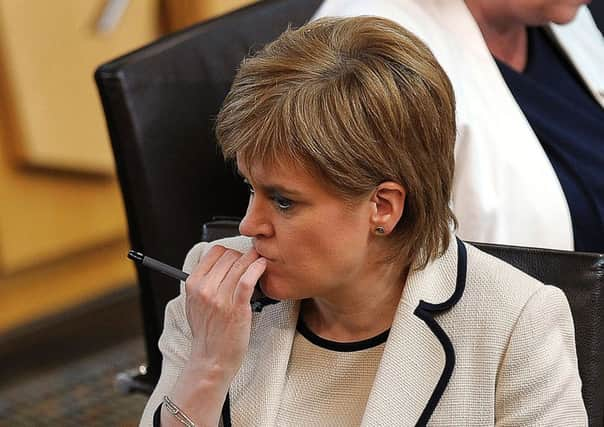Brian Monteith: Nicola Sturgeon has a lot to consider


The First Minister is setting herself up for a fall from an almighty height, and the new Prime Minister Theresa May is giving her a leg-up to do it. In one of the most fast-moving and fascinating political weeks since the turn of the millennium the country has gained a new prime minister, a new cabinet and the premier has then jetted up to Edinburgh to emphasise her commitment to maintaining unity of the United Kingdom.
Smartly, she offered to listen to what the SNP administration could come up with to maintain Scottish institutional links with the European Union separately from the UK, while her own government prepares its negotiating position for leaving.
Advertisement
Hide AdAdvertisement
Hide AdTellingly, while she believes there this no need for a second Scottish referendum on independence she does not appear to have ruled it out. Theresa May is going out of her way to be sweet reasonableness personified, leaving Nicola Sturgeon to find the solutions to the red lines of her own creation.
Thus far no one has shown how it would be possible for Scotland to remain within the single market or have free movement of labour while being in the United Kingdom.
The recent referendum asked voters if the United Kingdom, not Scotland, should remain a member of the EU or leave. The reason is obvious; it is the UK that is the member state and this puts the First Minister on far weaker ground than she cares to admit. Both Francois Hollande of France and Mariano Rajoy of Spain have both made it clear that negotiations will take place with the UK, not with part of it.
There are some who are mischievously suggesting Nicola Sturgeon now has a veto over the Prime Minister’s ability to trigger Article 50 that begins the withdrawal process, but Downing Street has been quick to deny this. The Prime Minister is looking to achieve a common UK position that enjoys the backing of the devolved administrations and is clearly going to employ a great deal of diplomatic wooing, but if she fails to win such support no guarantee has been given that she will hang around waiting. We can expect Article 50 to be triggered either side of the New Year and it will then be for Nicola Sturgeon to find the justification to call for a second referendum and have that passed in the Scottish Parliament.
Assuming that a new referendum proposal is passed at Holyrood, and this is by no means certain, then it will still be for Westminster to agree to sanction it. Just as the Edinburgh Agreement, signed by David Cameron and Alex Salmond, finalised the details of the franchise, the question and the timing for the vote in September 2014 there would need to be a similar agreement for any second independence referendum.
Conservative politicians north and south of the Border are not keen to be seen denying a referendum if the Scottish parliament calls for one, but a number of questions would have to be settled before that process could be agreed.
What would the question be the second time around? It does not follow that it should be the same as before with “Yes” and “No” options, given that testing by the Electoral Commission found that “Leave” and “Remain” provided fairer, more balanced, options for the EU referendum.
Most importantly the timing could become the sticking point, for although Theresa May’s government might agree to a referendum it may say it can only take place once her Brexit negotiations are concluded and the UK terms for leaving and the future EU relationship are known.
Advertisement
Hide AdAdvertisement
Hide AdThere would also be a very strong case for the Scottish government to demonstrate in advance of an independence referendum what its terms of EU membership would be so that those could be compared with what the UK had negotiated.
Would Scotland have to sign up to adopting the Euro within a stated period? Would Scotland, like the UK did, be able to opt out of the Schengen agreement that enforces open borders between EU members states? Without a hard border between Scotland and England would be required?
Scotland might hope to get some of what it would like, but EU membership is not an à la carte menu. The whip hand will be with the EU member states, with each and every one having a veto. Undoubtedly the terms of membership would be worse than they currently are and this would then be compared to the negotiated Brexit agreement that will offer the Holyrood parliament the management of agriculture and fisheries as well as an enhanced budget from savings that accrue from no longer paying EU membership costs and subsidies.
I fully expect the UK to set up a long list of tentative free trade deals that will make any potential downside to leaving the EU appear less risky. Already some 12 countries have indicated their willingness to start negotiating trade deals, including China, Australia, Malaysia, South Korea, USA – and there will be more to come. Such deals will offer a tempting prospect to Scottish businesses and our economy. Would Scotland, already trading nearly four times as much with the rest of the UK than it does with the EU, really want to miss out on these new opportunities when access to the single market would still be possible?
With the outline of her Brexit deal negotiated, Theresa May could then turn to Sturgeon and offer her the independence referendum. Scots could be offered a choice between two unions, being inside a prosperous post-Brexit UK or joining a declining EU that, with Britain gone, will have no reason to halt moving towards ever closer union.
Sturgeon would have to either accept the independence gamble and risk losing again – or suffer the most embarrassing of climbdowns and accept the Brexit terms.